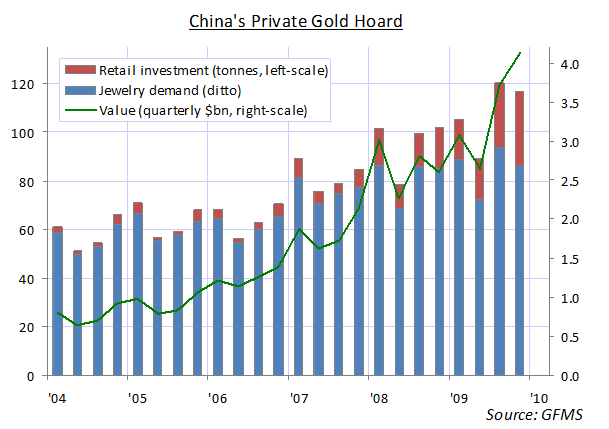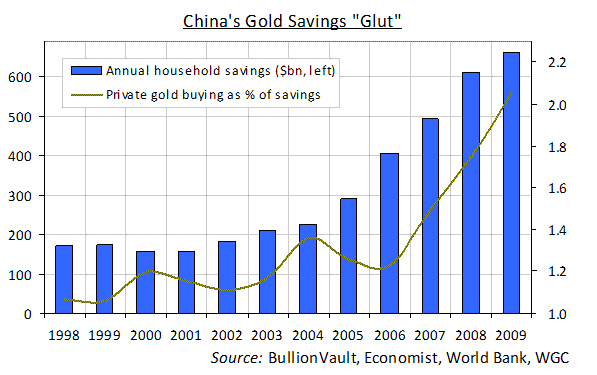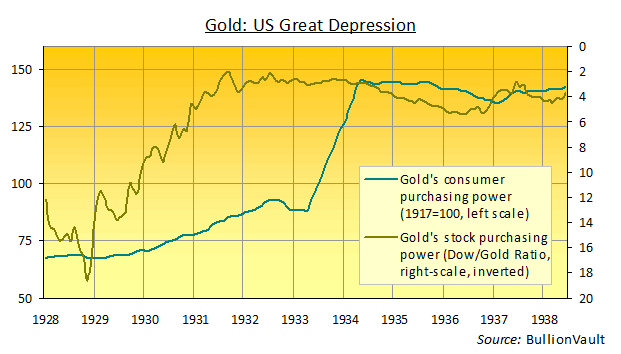Gold $5,000 Rapture, China Buys Gold!
Commodities / Gold and Silver 2010 Mar 29, 2010 - 12:51 PM GMTBy: Adrian_Ash
 Still waiting for that headline, plus the $5000 rapture it will bring...?
Still waiting for that headline, plus the $5000 rapture it will bring...?
"CHINA BUYS GOLD" is the story that all commodity journalists want to break, and the headline that gold bugs the world over most want to read.
Because if (or when) the People's Bank of China shifts from quietly adding domestic mine output to its reserves...and starts buying gold bullion in the international market instead...the rapture of $5000 gold will be upon us.
It's unlikely to play out like that, however – not until 2016 at least. First because Beijing's policy wonks aren't so stupid. And second, because "China buys gold" is already old news.

Mistaking a part for the whole – and assuming that China means the People's Bank alone – means missing the huge growth in private Chinese household demand of the last 5 years.
Rising 85% by weight since 2004, China's private gold demand has more than quadrupled in Dollars. It pretty much doubled by value in terms of both Dollars and the Renminbi in the last two years alone, rising to $13.6 billion in 2009.
Overall, China accounted for more than 14% of global gold investment and jewelry demand last year on the World Gold Council/GFMS data – a close second to the 16% of private world hoarding swallowed by India.
Now the World Gold Council forecasts that China's annual gold consumption has the potential to double in the next 10 years. Its new report notes the link between China's gold demand, runaway GDP growth, and phenomenal household savings rate. But it doesn't put a figure on that relationship – itself a blunt rebuke of the idea that modernization and consumer capitalism would see gold cast off as a barbaric relic...

Based on World Bank estimates of China's household savings rate – probably worth some $660bn last year – the proportion of private savings spent on gold investment and jewelry each year has almost doubled to 2.1% since the market was deregulated in 2001.
Yi Gang, deputy governor of the People's Bank of China and administrator of the State Administration of Foreign Exchange (SAFE), recently estimated that private households own some 3000 tonnes of gold. Two-thirds of that has been accumulated in the last 5 years alone. Those 1890 tonnes outweigh by four times the gold bought by SAFE and then transferred to the People's Bank between 2002 and 2009.
Perhaps that's been just as Beijing intended. Gold Mining output is a strategic target in the regime's current 5-year plan. Sending money offshore to plug the widening gap between local supply and demand, private citizens help reduce China's side of the global trade imbalance. They've also, all told, drained some $44bn from the banking system by swapping cash and bank-deposits for metal since the start of 2004. They'd clearly like to buy more, too.
"The size of the gold market is limited," Yi went on. "So China's [official] purchases of gold in the global market would push up global prices...China's domestic Gold Prices are related to global prices, so Chinese consumers will face higher prices and they won't like it."
The People's Bank, in other words, is sticking with its policy of buying domestic mine production for its own reserves – rather than open market supplies – because it's worried about upsetting China's voracious gold-buying public. Which is awfully sweet of the Communist dictators.
Trouble is, based on below-ground reserve estimates and the surge in China's mine output, China's gold mines could be all gone within six year says data from the US Geological Survey. So if the People's Bank finds good cause to keep buying gold in 2016, it will have to turn either to the global market...or pick up non-mine supplies closer-to-home...where it will just happen to find an extra 6,000 tonnes, according to the World Gold Council's projections, added to today's privately-held jewelry, coins and bars.
Handy!

Nationalizing private gold was what the US government did, under F.D.Roosevelt, when it banned private gold-bar and coin ownership in 1933. Which was a pity. Because that post-inflationary slump known as the Great Depression – which merely paused, and didn't halt, the United States' progress as world No.1 economy – would have proved a great time to preserve wealth with gold.
The Treasury confiscated gold – on pain of a $10,000 fine or imprisonment – at the price of $20.67 an ounce. Then raising the value of its hoard to $35 an ounce, Washington banned private dealing in non-adornment metal, leaving anyone who neglected to turn in their US-held gold a fugitive the moment they tried to sell it. Clinging onto gold outside the domestic US, on the other, and remaining free to realize its value, meant enjoying a 90% drop in the price of listed US equities, plus a halving in the cost of living.
That's something China's private gold-buyers might want to bear in mind today...if only they can get money offshore to buy gold and keep it there.
By Adrian Ash
BullionVault.com
Gold price chart, no delay | Free Report: 5 Myths of the Gold Market
Formerly City correspondent for The Daily Reckoning in London and a regular contributor to MoneyWeek magazine, Adrian Ash is the editor of Gold News and head of research at www.BullionVault.com , giving you direct access to investment gold, vaulted in Zurich , on $3 spreads and 0.8% dealing fees.
(c) BullionVault 2010
Please Note: This article is to inform your thinking, not lead it. Only you can decide the best place for your money, and any decision you make will put your money at risk. Information or data included here may have already been overtaken by events – and must be verified elsewhere – should you choose to act on it.
© 2005-2022 http://www.MarketOracle.co.uk - The Market Oracle is a FREE Daily Financial Markets Analysis & Forecasting online publication.



